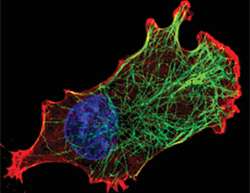Interfering with breast cancer metastasis

(Medical Xpress)—Nancy Hynes and her group at the Friedrich Miescher Institute for Biomedical Research have discovered an important mediator of breast cancer metastasis. The protein called Memo is not only required for cell migration and invasion, it is also an excellent prognostic marker for poor patient outcome and points the way to new therapeutic approaches.
Thanks to the tremendous advances in breast cancer therapy in the last twenty years, patients no longer invariably die from the primary tumor in the breast but rather from metastases, cancer cells spreading to other locations. This is good news for many, but it also brought to the limelight the relative lack of understanding of the proteins and signaling cascades involved in metastasis. A better understanding of the processes controlling cancer cell motility and invasion is clearly needed to develop new anticancer approaches.
Nancy Hynes, Group leader at the Friedrich Miescher Institute for Biomedical Research, and her team have identified and further characterized a protein called Memo, which plays an essential role in the formation of breast cancer metastasis. In their study published in Science Signaling they showed that Memo is required for cell migration and invasion. Their structural and biochemical analyses of Memo revealed that the protein binds copper and, as a copper-dependent redox protein, influences the oxidative milieu of a cell. This is particularly relevant because activation of a number of proteins through oxidation promotes the movement of cells.
Hynes and her collaborators further showed that Memo is an excellent prognostic marker for poor patient outcome. The abundance of Memo correlated well with many parameters of aggressive disease ‒ even better than lymph node status, the currently most important indicator of disease-free survival and overall survival in breast cancer. Hynes comments: "This finding is particularly noteworthy, because in our study we look at breast cancer patients with a generally good prognosis. Most of them were estrogen receptor or progesterone receptor positive, showed no lymph node involvement and had low-grade tumors." Nevertheless, increased amounts of Memo were found in about 7% of the patients, which predicted early metastasis and death.
Since Memo requires copper for its activity, it is interesting to consider copper chelation therapies currently in phase 2 clinical trials. The FMI scientists showed that the copper chelator tetrathiomolybdate (TM) had a pronounced effect on the invasive ability of breast cancer cells and their results suggest that Memo is one of the important targets. "We think that Memo may be one of the major copper-bound enzymes that promote invasion," said Hynes.
More information: MacDonald G, Nalvarte I, Smirnova T, Vecchi M, Aceto N, Dolemeyer A, Frei A, Lienhard S, Wyckoff J, Hess D, Seebacher J, Keusch JJ, Gut H, Salaun D, Mazzarol G, Disalvatore D, Bentires-Alj M, Di Fiore PP, Badache A, Hynes NE (2014) "Memo is a copper-dependent redox protein with an essential role in migration and metastasis." Sci Signal. 2014 Jun 10;7(329):ra56. DOI: 10.1126/scisignal.2004870.


















